
Francis Kwame Nkrumah was a Ghanaian politician, political theorist, and revolutionary. He served as Prime Minister of the Gold Coast from 1952 until 1957, when it gained independence from Britain. He was then the first Prime Minister and then the President of Ghana, from 1957 until 1966. An influential advocate of Pan-Africanism, Nkrumah was a founding member of the Organization of African Unity and winner of the Lenin Peace Prize from the Soviet Union in 1962.

The national flag of Ghana consists of a horizontal triband of red, yellow, and green. It was designed in replacement of the British Gold Coast's Blue Ensign.

Edward Akufo-Addo was a Ghanaian politician and lawyer. He was a member of the "Big Six" leaders of the United Gold Coast Convention (UGCC) and one of the founding fathers of Ghana who engaged in the fight for Ghana's independence. He became the Chief Justice (1966–70), and later ceremonial President (1970–72), of the Republic of Ghana. He was the father of the current (executive) President of Ghana, Nana Addo Akufo-Addo.
The Accra riots started on 28 February 1948 in Accra, the capital of the then British colony of the Gold Coast. A protest march by unarmed ex-servicemen who were agitating for their benefits as veterans of World War II, who had fought with the Gold Coast Regiment of the Royal West African Frontier Force, was broken up by police, leaving three leaders of the group dead. They were Sergeant Nii Adjetey, Corporal Patrick Attipoe and Private Odartey Lamptey. who has since been memorialized in Accra.
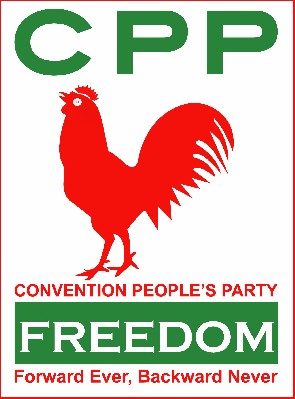
The Convention People's Party (CPP) is a socialist political party in Ghana based on the ideas of the first President of Ghana, Kwame Nkrumah. The CPP was formed in June 1949 after Nkrumah broke away from the United Gold Coast Convention (UGCC).

Joseph Kwame Kyeretwie Boakye Danquah was a Ghanaian politician, scholar, lawyer and statesman. He was a politician in pre- and post-colonial Ghana, which was formerly the Gold Coast, and is credited with giving Ghana its current name.
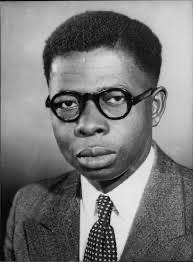
Ako Adjei, was a Ghanaian statesman, politician, lawyer and journalist. He was a member of the United Gold Coast Convention and one of six leaders who were detained during Ghana's struggle for political independence from Britain, a group famously called The Big Six. He has been recognized as a founding father of Ghana for his active participation in the immediate politics of Ghana's pre-independence era. Adjei became a member of parliament as a Convention People's Party candidate in 1954 and held ministerial offices until 1962 when as Minister for Foreign Affairs he was wrongfully detained for the Kulungugu bomb attack.
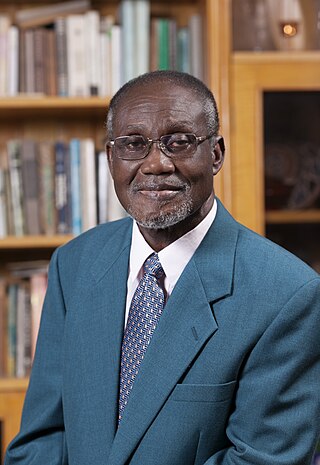
Obed Yao Asamoah is a Ghanaian lawyer, academic and politician. Asamoah was the longest serving foreign minister and Attorney General of Ghana under Jerry Rawlings from 1981 to 1997. Asamoah was educated at King's College London and at Columbia University.
The Big Six were six leaders of the United Gold Coast Convention (UGCC), one of the leading political parties in the British colony of the Gold Coast, known after independence as Ghana. They were detained by the colonial authorities in 1948 following disturbances that led to the killing of three World War II veterans. They are pictured on the front of the Ghana cedi notes.

William Ofori Atta, popularly called "Paa Willie", was a founding member of the United Gold Coast Convention (UGCC) and one of the founding fathers of Ghana as one of "The Big Six" detained by the British colonial government in the then Gold Coast. He later became a Minister for Foreign Affairs in Ghana's second republic between 1971 and 1972.
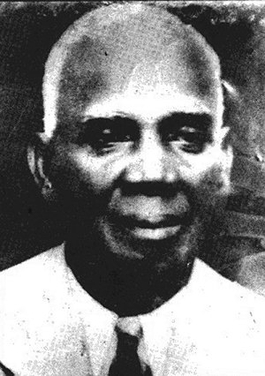
George Alfred Grant, popularly known as Paa Grant, was a merchant and politician in the Gold Coast who has been called "the father of Gold Coast politics". As a political activist, he was a founder and the first president of the United Gold Coast Convention (UGCC) in August 1947. He was also one of Ghana's Founding Fathers. He paid for Kwame Nkrumah to return to Ghana from the United States.
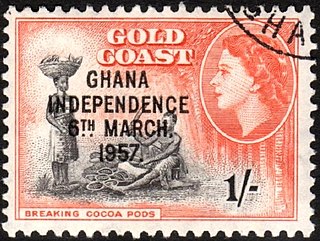
Ghana gained independence from the British on 6 March 1957. It is a member of the Commonwealth of Nations. The country became a republic on July 1, 1960.
Founders' Day is a national public holiday observed to commemorate the contributions of all the people, notably the "Big Six" who led the struggle for Ghana's independence. The Founder's Day was formerly called "Founder's Day" with the letter "S" appearing after an apostrophe and it was celebrated to earmark the achievements of Osagyefo Dr. Kwame Nkrumah.
Mabel Dove Danquah was a Gold Coast-born journalist, political activist, and creative writer, one of the earliest women in West Africa to work in these fields. As Francis Elsbend Kofigah notes in relation to Ghana's literary pioneers, "before the emergence of such strong exponents of literary feminism as Efua Sutherland and Ama Ata Aidoo, there was Mabel Dove Danquah, the trail-blazing feminist." She used various pseudonyms in her writing for newspapers from the 1930s: "Marjorie Mensah" in The Times of West Africa; "Dama Dumas" in the African Morning Post; "Ebun Alakija" in the Nigerian Daily Times; and "Akosua Dzatsui" in the Accra Evening News. Entering politics in the 1950s before Ghana's independence, she became the first woman to be elected a member of any African legislative assembly. She created the awareness and the need for self-governance through her works.
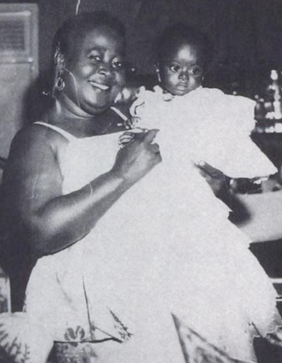
Hannah Esi Badu Kudjoe, née Hannah Dadson, was a prominent activist for Ghanaian independence in the 1940s and 1950s. She was one of the first high-profile female nationalists in the movement, and was the National Propaganda Secretary for the Convention People's Party. She was a political activist during the government of Dr. Kwame Nkrumah. She was also an active philanthropist and worked to improve women's lives in Northern Ghana. Hannah had the ability to bring people together. She was able to convince others to support and fight for independence. She helped Kwame Nkrumah in bringing people to join the CPP and support it. She once helped the Big Six when they were arrested by bringing people together to call for their release by the colonial government.
Adeline Sylvia Eugenia Ama Yeboakua Akufo-Addo was a First Lady in the second republic of Ghana as the wife of Edward Akufo-Addo and mother of Ghanaian president Nana Akufo-Addo.
The Coussey Committee was established on 14 March 1949, after the 1948 Accra riots, to draft a constitution towards self-rule for the country Gold Coast. The committee was chaired by Sir Henley Coussey and published their report on 7 November 1949.

The Political history of Ghana recounts the history of varying political systems that existed in Ghana during pre-colonial times, the colonial era and after independence. Pre-colonial Ghana was made up of several states and ethnic groups whose political system was categorized by 3 main administrative models; Centralized, Non-centralized and Theocratic states. In the colonial era, the British Empire employed different forms of government among its four territorial possessions in the Gold Coast. Indirect rule was implemented in the late 19th century after its success in Northern Nigeria. From the 1940s, native Ghanaians yearned for more autonomy. This resulted in the several constitutional reforms as well as the creation of the office of the Prime Minister in 1952.











